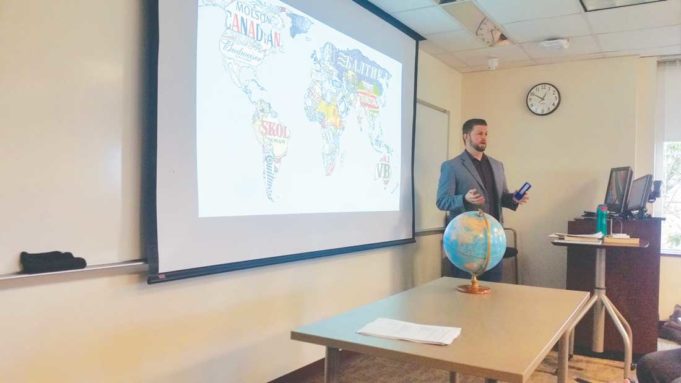As the classroom filled, extra chairs were brought in. More than 40 chatty TCU undergrads in Dave C. Reed Hall were awaiting marching orders from geography professor Sean Crotty. His remarks on the pending beer course were, um, sobering.
“I recognize a few of you from my other geography classes,” he said. “But there are many new faces. Some of you may have signed up because you read the word ‘beer.’ This is a real class. There will be tests. I want to make sure everyone is invested in this.”
In addition, he noticed that many of his prospective students were underage.
“I am not encouraging you to consume alcohol in any way,” he said.
Disclaimer finished, Crotty began talking beer. In the syllabus, he outlines topics ranging from the history of beer to beer regions around the world and beer tourism.
“If you want to open a brewery, where do you go?” he asked rhetorically, referring to the global economics of brewing. “Can you grow barley on a mountain? How difficult would that be to harvest? Those are the kinds of things we are going to look at.”
Beer and geography aren’t usually paired together like, say, hops and grain. But the course is capitalizing on a nationwide fascination with craft beer. Even 10 years ago, a college class on brews might have sounded odd. (What’s edifying about corporations churning out millions of barrels of yellow, fizzy suds?) Growth in the craft beer world has been accompanied with increased interest (through blogs, books, and documentaries) into the role beer played shaping human history and how it shapes our culture to this day.
Some of the images projected on the front wall added levity to an otherwise weighty discussion. A world map displayed countries embossed with beer labels. The rendering largely made sense — Budweiser’s patriotic logo was stamped on the United States — but one Central African nation stood out.
“I’m not sure Shiner Brewing is really the beer of choice in Chad,” he said.
The point of the exercise was that maps aren’t always accurate. Every map has strengths and weaknesses.
In the lecture, Crotty also touched on American history. Germans and Czechs, he said, have had the biggest influence in shaping this country’s beer palate.
“The central hubs for brewing were St. Louis and Milwaukee,” he said. “Those businesses were helped by rail lines that allowed them to reach Texas and other states.”
Freshman Steve Letzelter had stumbled across the class while registering online. The topic sounded fun, he said, and he was surprised how deep the subject matter ran.
“I expected to learn about where the best places to brew beer are,” he said. “The first class opened my eyes to the history, religion, and other things that shaped beer and wine history.”
Now he’s interested in learning how beer influenced the growth of the United States and other countries. His first group project is to map out the location of breweries across the United States.
Jackson Blake, a junior majoring in geography, took the course at Crotty’s advice. During his freshman year, Blake was interested in meteorology and landscape architecture. Geography allows him to combine both passions, he said.
“I was surprised to learn that Germans not only brought lagers and pilsners to the New World, they brought new concepts about design and architecture,” he said. “I’m very passionate about subjects related to geography. Geography is all about people and how they interact with their environment. It’s very relevant.”
The first day of class concluded with discussions of how breweries market to specific audiences.
“Macro brewers [like Budweiser and MillerCoors] all pitch the same basic idea,” Crotty said, pointing to an overhead projection. “All the labels are red, white, and blue. They feature patriotic images. Budweiser even went so far as to label its beer ‘America’ recently.”
Microbreweries do the opposite, he added, giving examples of craft beer brewery logos based on local themes. Fort Worth’s Wild Acre Brewing Company served as an example. The brewery’s popular session bock, Billy Jenkins, is named after General Williams Jenkins Worth, the founder of Fort Worth.
The students appeared attentive throughout the 80-minute class. If the course proves successful, Crotty hopes TCU higher-ups will allow the course to be offered the following academic year.













Great story!